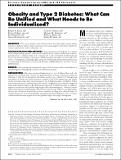| dc.contributor.author | Eckel, Robert H. | |
| dc.contributor.author | Kahn, Steven E. | |
| dc.contributor.author | Ferrannini, Ele | |
| dc.contributor.author | Schwartz, Michael W. | |
| dc.contributor.author | Smith, Steven R. | |
| dc.contributor.author | Goldfine, Allison Braunwald | |
| dc.contributor.author | Nathan, David Matthew | |
| dc.contributor.author | Smith, Robert J. | |
| dc.date.accessioned | 2013-03-14T14:14:55Z | |
| dc.date.issued | 2011 | |
| dc.identifier.citation | Eckel, Robert H., Steven E. Kahn, Ele Ferrannini, Allison B. Goldfine, David M. Nathan, Michael W. Schwartz, Robert J. Smith, and Steven R. Smith. 2011. Obesity and type 2 diabetes: What can be unified and what needs to be individualized? Diabetes Care 34(6): 1424-1430. | en_US |
| dc.identifier.issn | 0149-5992 | en_US |
| dc.identifier.uri | http://nrs.harvard.edu/urn-3:HUL.InstRepos:10403681 | |
| dc.description.abstract | Objective: This report examines what is known about the relationship between obesity and type 2 diabetes and how future research in these areas might be directed to benefit prevention, interventions, and overall patient care. Research Design and Methods: An international working group of 32 experts in the pathophysiology, genetics, clinical trials, and clinical care of obesity and/or type 2 diabetes participated in a conference held on 6–7 January 2011 and cosponsored by The Endocrine Society, the American Diabetes Association, and the European Association for the Study of Diabetes. A writing group comprising eight participants subsequently prepared this summary and recommendations. Participants reviewed and discussed published literature and their own unpublished data. Resutls: The writing group unanimously supported the summary and recommendations as representing the working group's majority or unanimous opinions. Conclusions: The major questions linking obesity to type 2 diabetes that need to be addressed by combined basic, clinical, and population-based scientific approaches include the following: 1) Why do not all patients with obesity develop type 2 diabetes? 2) Through what mechanisms do obesity and insulin resistance contribute to \(\beta\)-cell decompensation, and if/when obesity prevention ensues, how much reduction in type 2 diabetes incidence will follow? 3) How does the duration of type 2 diabetes relate to the benefits of weight reduction by lifestyle, weight-loss drugs, and/or bariatric surgery on \(\beta\)-cell function and glycemia? 4) What is necessary for regulatory approval of medications and possibly surgical approaches for preventing type 2 diabetes in patients with obesity? Improved understanding of how obesity relates to type 2 diabetes may help advance effective and cost-effective interventions for both conditions, including more tailored therapy. To expedite this process, we recommend further investigation into the pathogenesis of these coexistent conditions and innovative approaches to their pharmacological and surgical management. | en_US |
| dc.language.iso | en_US | en_US |
| dc.publisher | American Diabetes Association | en_US |
| dc.relation.isversionof | doi:10.2337/dc11-0447 | en_US |
| dc.relation.hasversion | http://www.ncbi.nlm.nih.gov/pmc/articles/PMC3114323/pdf/ | en_US |
| dash.license | LAA | |
| dc.title | Obesity and Type 2 Diabetes: What Can Be Unified and What Needs to Be Individualized? | en_US |
| dc.type | Journal Article | en_US |
| dc.description.version | Version of Record | en_US |
| dc.relation.journal | Diabetes Care | en_US |
| dash.depositing.author | Goldfine, Allison Braunwald | |
| dc.date.available | 2013-03-14T14:14:55Z | |
| dc.identifier.doi | 10.2337/dc11-0447 | * |
| dash.authorsordered | false | |
| dash.contributor.affiliated | Nathan, David | |
| dash.contributor.affiliated | Goldfine, Allison B. | |


